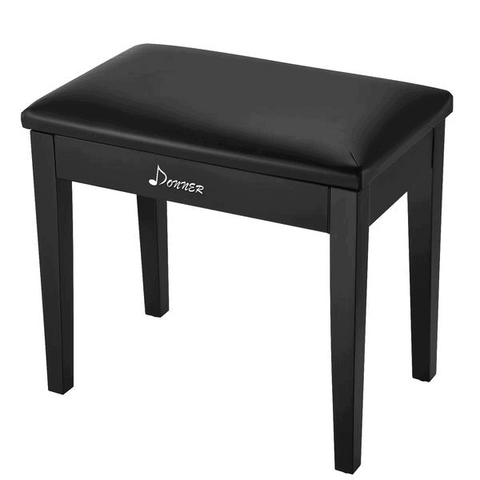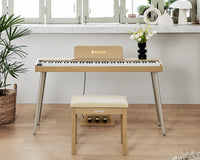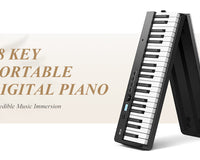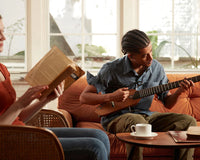In recent years, we have seen an incredible improvement in the quality of digital pianos. They now offer, more than ever, quality sound, and advances in materials have allowed designers and manufacturers to offer digital pianos at a lower price than ever. The portability of digital pianos also makes them the ideal choice for those who alternate between indoor and concert performances. It is for all these reasons that digital pianos have become incredibly popular with musicians and especially beginners. However, a number of features and options may seem confusing to novices.
As always, Donner is here to help you get the perfect instrument in your hands. We hope that after reading this short buying guide, you will be more comfortable in your purchase choice.
Summary
- Presentation of the Digital Piano
- Why Choose a Digital Piano?
- Adjusting Volume and Variable Tones
- Portability and Cost
- Registration and Extension
- Educational Tools
- Types of Digital Piano
- Important Features of a Digital Piano You Should Pay Attention To
- Sound Quality
- Key Response and Sensitivity
- Don't be Impressed by the Number of Sound Effects
- Polyphony
- Amplifications and Outputs
- Support and Tools
- Accessories
- More information
Presentation of the Digital Piano
The Digital Piano was developed in the 60s and 70s, and became popular in the 80s and early 90s as an excellent substitute for the large acoustic piano. The operation of a digital piano is simple: an electronic signal is created when one of the keys is pressed, depending on the velocity and force with which the key was activated but also depending on other conditions such as position of the foot pedal, the piano will reproduce a sound appropriate to the situation. This sound produced comes from a library of sample recordings, that is to say sound samples recorded from a real acoustic piano, in order to reproduce the sound of hammer mechanics as realistically as possible. Every instrument that uses this sample recording technology to reproduce the sound of a piano falls into the category of digital pianos.
Before you make your final decision about purchasing your piano, there are a few features you should consider first.
Why Choose a Digital Piano?
If you are still undecided about purchasing an acoustic or digital piano, here are some important aspects that you should consider in your decision.
Adjusting Volume and Variable Tones
Like all electric instruments, the sound volume of a digital piano is easily adjustable. On the best models, you can even adjust the EQ (equalizer) to get the exact sound you're looking for. On a digital piano, you can also plug in your headphones/pair of headphones, in order to immerse yourself in your world of music, without disturbing the people around you. Digital pianos notably benefit from a variety of sounds other than those of a piano. With a simple press of a button, you can get the sound of a guitar, bass, flute, violin and more.
Portability and Cost
Playing on an acoustic piano will give you all the elegance in the world, however there is one major problem: its portability. For people who need to travel often with their instrument, the portability of a digital piano is a necessity. Digital pianos are also much less expensive than their acoustic piano counterparts. Acoustic pianos also require a lot of maintenance to keep them functional and tuned, which can come at a certain cost.
Registration and Extension
As a beginner, recording your progress and sharing it with others can be rewarding. With its recording functionality, you can easily record your songs in high definition. Digital pianos also benefit from jack outputs, allowing you to record your songs more directly with other equipment. Recording your pieces from an acoustic piano would require more equipment and a perfectly controlled environment.
Educational Tools
Most digital pianos have many built-in educational tools, such as backing tracks or metronomes. Some even display the notes on the monitor screen. These features can be extremely beneficial for beginners to help them practice their fundamentals.
Types of Digital Piano
Upright Digital Piano
Upright pianos, also known as console pianos, are generally used for domestic purposes. They generally benefit from better furniture, giving them the appearance of traditional acoustic pianos with their three pedals. And even if it doesn't look like it, it benefits from the many electronic components of a digital piano, in addition to the integrated speakers. Thanks to its traditional advantages, it will beautify your interior.
Donner DEP-10S Digital Piano Keyboard 88 Semi-Weighted Keys
With 128 polyphonies and 8 premium sounds, the DEP-10 with semi-weighted feel gives you a pleasant playing response. In addition, the 3 pedals (Soft/ Sustain/ Sostenuto) provide you with a certain quality and more expression for your performances. Whether you are on stage or in a room, you can play your favorite music with your headphones (6.35mm jack) or on your amplifier. Based on quality know-how and equipped with high-definition sound, this instrument will accelerate your learning and perfect your performance. Progress is immediately visible with a quality instrument!
Donner DEP-20S 88 Keys Weighted Digital Piano Keyboard
With its 128 polyphonies, the Donner DEP-20 offers you 200 rhythms and 238 premium piano sounds. Its heavy touch keys allow you to better feel what you are playing. The DEP-20 has standard piano pedals and audio jack outputs.
Portable Digital Piano
With a different design philosophy, portable digital pianos are designed to be more easily transportable for players who alternate between studio and stage performance. Unlike upright digital pianos, portable pianos are supported by legs. They also usually have fewer pedals but more rhythms and sounds available. Portable models also usually have more options than upright pianos, which is why it is important to know your musical needs before making an acquisition choice.
Donner DEP-20 Fully Weighted 88-Key Digital Piano
Donner DEP-45 Digital Keyboard 88 Semi-Weighted Keys
The Donner DEP-45 features a duo keyboard mode, splitting the keyboard in two, with identical notes, as if it were two separate keyboards. This mode is generally very useful when it comes to teaching, the teacher and the student can then play on the same keyboard with similar notes and tones. This keyboard is intended for more experienced musicians. The Extra Duo Voice feature can play two different sounds from the recording library on just one keyboard allowing you to play two different parts at the same time. The DEP-45 is suitable for MIDI connections for your computer, allowing you to expand the recording possibilities of your songs.
Important Features of a Digital Piano You Should Pay Attention To
Sound Quality
When an instrument is evaluated, sound quality is always a priority. Digital pianos are no exception to the rule, and their sound quality depends mainly on their electronic components. Even if a digital piano has an excellent library of sound recordings, without quality output, it will not sound good. When evaluating a digital piano, it is still important to look at the average realism of its sound. More generally, the best digital pianos have more memory, which allows them to reproduce a wider range of sounds and therefore to reproduce the tones of an acoustic piano with more realism and fidelity.
Key Response and Sensitivity
Key touch, response and feel are extremely important factors to pay attention to. This is a point that you will be directly confronted with and the feeling of playing the keys will be a determining factor in your enjoyment of playing your instrument. On acoustic pianos, sound is produced using hammer mechanics. These hammers connected to the keys by wires will therefore cause a certain tension when they are played. Things are therefore more complicated to reproduce on digital pianos. There are three types of touch for the keys on digital piano: unweighted, semi-weighted and weighted. If your budget is limited but you still want a quality keyboard with a playing sensation similar to that of an acoustic piano, digital pianos with weighted or semi-weighted keyboards could be an excellent alternative for you! These keys reproduce the playing sensation of hammer action. In particular, if you are looking for a playing sensation similar to that on an acoustic piano, on your electric piano, you can choose a weighted keyboard, with a heavy feel, which is also enhanced with progressive weighting. As on an acoustic piano, the highest notes require less effort to activate the hammer action than the lowest notes, the heavy touch then progressive throughout the keyboard, and digital pianos with heavy touch, 100% weighted, can reproduce it.
Another important key factor that could affect your gaming is the sensitivity of the keys. As mentioned in the introduction, velocity-sensitive sensors detect the speed and force at which keys are struck. With this data, they calculate the appropriate sound to reproduce corresponding to a similar situation on an acoustic piano. High-end digital pianos capture the smallest subtleties of your playing, while determining the timbre and sound to be reproduced.
Don't be Impressed by the Number of Sound Effects
It may seem fun to be able to play lots of musical instruments other than the piano on your keyboard, but you should not fall into the trap of quantity over quality. Although it is distracting and intriguing to be able to play numerous instruments with just your keyboard, you will soon enough discover that the first mode: classical piano, will be the one you use the most. This is why its quality should not be neglected.
Polyphony
Polyphony refers to the number of notes a piano can play at the same time. Basic models offer 32 or 64 note polyphony. We recommend getting a piano with a polyphony of at least 32 notes. The greater the polyphony, the better. You can go up to 128 notes and even more if you need to.
Amplification and Outputs
If you are more likely to use it at home, although most digital pianos have built-in speakers, having a good quality amplifier can be important. But if you're playing on stage, make sure your piano has all the ports needed to connect to a real sound system.

The Donner Digital Piano has numerous inputs, outputs and jack settings.
Support and Tools
To help beginners in their learning, piano manufacturers have incorporated features that can help them progress more quickly. Most pianos available on the market offer the possibility of playing rhythms at different speeds at the same time as you practice. These rhythm sequences allow you to practice your sense of tempo and understanding of playing speeds. If these percussions seem too distracting, you can simply launch the metronome function. Practicing along with a metronome is highly recommended for beginners. Many models also benefit from a screen to be able to visually follow the notes, chords, and score played or which must be played. This feature is also very appreciated by beginners.
Accessories
Whether you're buying a piano to play at home or on stage, you'll definitely need accessories.
Feet/Support
If you are purchasing a digital piano and no stand is included in the bundle, you will likely need to purchase one separately. They are generally foldable, adjustable and easily transportable.
Bench
You will most likely need to be seated comfortably at your piano, which is why a piano bench/stool is an important item to check. Sitting comfortably will allow you to be totally focused on your performance.
Donner Adjustable Piano Keyboard Bench with Foam Cushion
On a bench with X-legs you can adjust the height with three screw positions, to ensure you are seated comfortably when playing your instrument.
The Donner X-Shaped Benches benefit from high-density foam that does not deform and can support up to 115 kilos.
Donner Piano Bench with Sheet Music Storage
If you play an acoustic or digital upright piano, a classic bench is ideal, however, they cannot be adjusted. These benches are made of wood and will prove their solidity over time. The foam resists deformation and can support up to 140Kg. They also have storage for your notebooks and music scores.
Amplifier and Cables
In general, to be heard, the piano speakers will do the trick. However, when you are doing concerts, a digital piano amplifier and cables are necessary.
More information
If you have any questions about digital piano or any other related subject, do not hesitate to contact us, by clicking on the “Contact Us” button. We will be happy to help you!
































